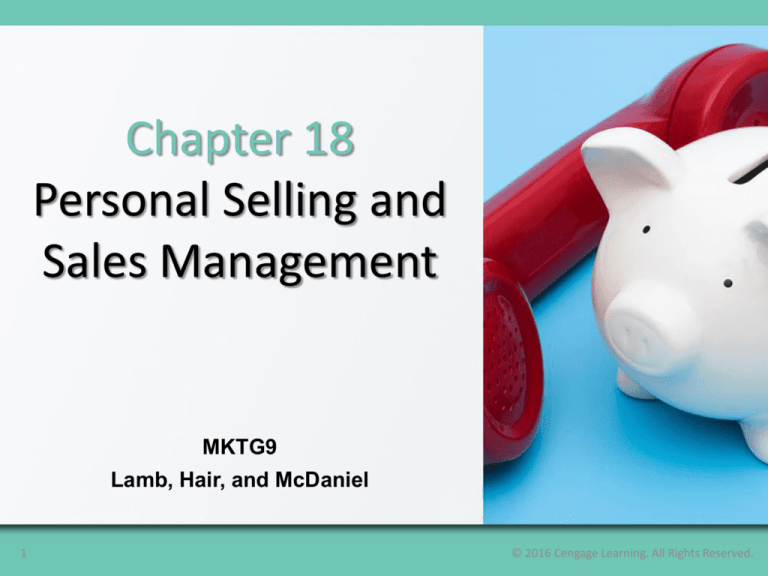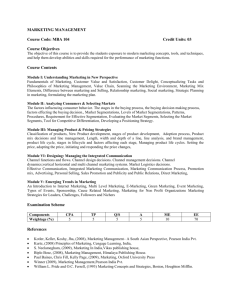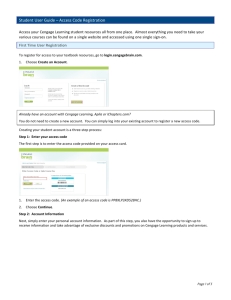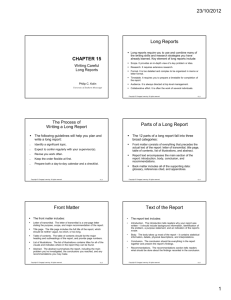
Chapter 18
Personal Selling and
Sales Management
MKTG9
Lamb, Hair, and McDaniel
1
© 2016 Cengage Learning. All Rights Reserved.
LEARNING OUTCOMES
18-1 Describe personal selling
18-2 Discuss the key differences between
relationship selling and traditional selling
18-3 Describe customer relationship
management
18-4 List the steps in the selling process
18-5 Describe the functions of sales
management
© 2016 Cengage Learning. All Rights Reserved.
2
18-1
Personal Selling
Describe Personal
Selling
© 2016 Cengage Learning. All Rights Reserved.
Advantages of
Personal Selling
Personal selling provides detailed explanation or
demonstration of the product.
Message can be varied according to motivations of
each customer.
Personal selling can be directed only to qualified
prospects.
Costs can be controlled by adjusting the size of the
sales force in one-person increments.
Personal selling is considerably more effective than
other forms of promotion in obtaining a sale and
gaining a satisfied customer.
© 2016 Cengage Learning. All Rights Reserved.
4
18-2
Relationship Selling
Discuss the key
differences between
relationship selling and
traditional selling
© 2016 Cengage Learning. All Rights Reserved.
Relationship Selling
Relationship selling, or
consultative selling, is a sales
practice that involves building,
maintaining, and enhancing
interactions with customers in
order to develop long-term
satisfaction through mutually
beneficial partnerships.
© 2016 Cengage Learning. All Rights Reserved.
6
18.1
Comparison of Personal Selling
and Advertising/Sales Promotion
Personal selling is important
if…
Advertising and sales
promotion are more
important if…
The product has a high value.
The product has a low value.
It is a custom-made product.
It is a standardized product.
There are few customers.
There are many customers.
The product is technically
complex
The product is easy to
understand.
Customers are concentrated
Customers are geographically
dispersed.
Examples: Insurance policies,
custom windows, airplane
engines
Examples: Soap, magazine
subscriptions, cotton t-shirts
© 2016 Cengage Learning. All Rights Reserved.
7
18.2
Key Differences between
Traditional Selling and
Relationship Selling
Traditional Personal Selling
Relationship or Consultative Selling
Sell products (goods and services)
Sell advice, assistance, and counsel
Focus on closing sales
Focus on improving the customer’s bottom
line
Limited sales planning
Consider sales planning as top priority
Spend most contact time telling customers
about product
Spend most contact time attempting to build a
problem-solving environment with the
customer
Conduct “product-specific” needs assessments Conduct discover in the full scope of the
customer’s operations
“Lone wolf” approach to the account
Team approach to the account
Proposals and presentations based on pricing
and product features
Proposals and presentations based on profit
impact and strategic benefits to the customer
Sales follow-up is short term, focused on
product delivery
Sales follow-up is long term, focused on longterm relationship enhancement
SOURCE: Robert M. Peterson, Patrick Schul, and George H. Lucas, Jr., “Consultative Selling: Walking the Walk in the New Selling
Environment,” National Conference on Sales Management Proceedings, March 1996.
© 2016 Cengage Learning. All Rights Reserved.
8
Customer Relationship
18-3
Management and Personal Selling
Describe customer
relationship
management
© 2016 Cengage Learning. All Rights Reserved.
Customer Relationship
Management
Identify customer relationships
Understand interactions of the
customer base
Capture customer data
Leverage customer
information
© 2016 Cengage Learning. All Rights Reserved.
10
Identify Customer
Relationships
Companies that have CRM systems:
• Follow a customer-centric focus or
model
• Use knowledge management systems
• Organize information gathered
through the “learning” process
• Learn via interactions
© 2016 Cengage Learning. All Rights Reserved.
11
Interactions of the Current
Customer Base
CRM is built on interactions between
customers and organizations.
• Touch points occur at a wide
variety of locations.
– Web-based interactions are an
increasingly popular.
– One popular touch point is the pointof-sale touch point.
© 2016 Cengage Learning. All Rights Reserved.
12
Capturing Customer Data
Rather than focusing on the amount
of data that can be obtained,
companies should focus on the type
of data to be acquired and how it can
be used to enhance relationships.
© 2016 Cengage Learning. All Rights Reserved.
13
Leveraging Customer
Information
Campaign management
Retaining loyal customers
Cross-selling other
products and services
Designing targeted marketing
communications
© 2016 Cengage Learning. All Rights Reserved.
14
18-4
Steps in the
Selling Process
List the steps in
the selling process
© 2016 Cengage Learning. All Rights Reserved.
Steps in the Selling Process
Generate Leads
Qualify Leads
Probe Customer Needs
Develop Solutions
Handle Objections
Close the Sale
Follow Up
© 2016 Cengage Learning. All Rights Reserved.
16
Generating Leads
Advertising
Webinars
Trade Shows/
Conventions
Direct Mail
Social Media
Telemarketing
Referrals
Networking
Cold Calling
© 2016 Cengage Learning. All Rights Reserved.
17
Cold Calling
A form of lead generation in which
the salesperson approaches
potential buyers without any prior
knowledge of the prospects’ needs
or financial status.
© 2016 Cengage Learning. All Rights Reserved.
18
Qualifying Leads
Recognized need
Buying power
Receptivity and
accessibility
© 2016 Cengage Learning. All Rights Reserved.
19
Approaching the Customer
and Probing Needs
A needs assessment is a
determination of the customer’s
specific needs and wants and the
range of options a customer has
for satisfying them.
© 2016 Cengage Learning. All Rights Reserved.
20
The Consultative Salesperson
Product or service
Salesperson
must know
everything
about...
Customers
Competition
Industry
© 2016 Cengage Learning. All Rights Reserved.
21
Developing and
Proposing Solutions
The
Sales Proposal is…
A formal written document or
professional presentation that outlines
how the salesperson’s product or service
will meet or exceed the prospect’s needs.
The
Sales Presentation is…
A formal meeting in which the
salesperson presents a sales proposal to
a prospective buyer.
© 2016 Cengage Learning. All Rights Reserved.
22
Handling Objections
View objections as requests for
information.
Anticipate specific objections.
Investigate the objection with the
customer.
Be aware of competitors’ products.
Stay calm.
Use the objection to close the sale.
© 2016 Cengage Learning. All Rights Reserved.
23
Closing the Sale
Look for
customer signals
Keep an open mind
Negotiate
Tailor to each market
© 2016 Cengage Learning. All Rights Reserved.
24
Following Up
In the final step of the selling
process—the follow up—the
salesperson must ensure:
Delivery schedules are met
Goods or services perform as
promise
Buyers’ employees are properly
trained to use the products
© 2016 Cengage Learning. All Rights Reserved.
25
18-5
Sales Management
Describe the functions of
sales management
© 2016 Cengage Learning. All Rights Reserved.
Sales Management
Sales managers must:
• Define sales goals and the sales
process
• Determine the sales force structure
• Recruit and train the sales force
• Compensate and motivate the sales
force
• Evaluate the sales force
© 2016 Cengage Learning. All Rights Reserved.
27
Sales Goals and the Sales
Process
• Sales goals provide salespeople
with targets and measurements.
– Usually goals are developed in terms
of desired dollar values, market
share, or profit level.
– Goals are stated as quotas, or
statements of a salesperson’s goals.
© 2016 Cengage Learning. All Rights Reserved.
28
Sales Force Structure
Sales department organization:
• Regional
• Product Line
• Marketing Function Performed
• Market or Industry
• Client or Account
– Allows for more specific and better
customer service
© 2016 Cengage Learning. All Rights Reserved.
29
The Sales Force
Strong Ego
Risk Taker
Sense of
Urgency
Intelligent
Assertiveness
Creative
Sociable
Empathetic
Relationship Oriented
© 2016 Cengage Learning. All Rights Reserved.
30
Compensating the Sales Force
• Compensation planning is one of the
sales manager’s toughest jobs. Only
good planning will ensure that
compensation attracts, motivates, and
retains good salespeople.
• Although the compensation plan
motivates a salesperson to sell,
sometimes it is not enough to produce
the volume of sales or the profit margin
required by sales management.
© 2016 Cengage Learning. All Rights Reserved.
31
Evaluating the Sales Force
• Performance evaluations allow
managers to review the strengths
and weaknesses of the sales force.
• This information can then tell a
manager what sales skills might
need to be reassessed or retrained.
© 2016 Cengage Learning. All Rights Reserved.
32
The Impact of Technology on
Personal Selling
Cell Phones
Laptops
Pagers
E-Mail
Electronic Organizers
Internet
© 2016 Cengage Learning. All Rights Reserved.
33
Chapter 18 Video
New Balance Hubway
New Balance Hubway is a bike-sharing system
located in Boston Massachusetts designed to
augment existing transportation systems in the
greater Boston area. In this clip, Hubway
discusses how they generate buzz and get
funding to build their bike share network.
CLICK TO PLAY VIDEO
34
© 2016 Cengage Learning. All Rights Reserved.






